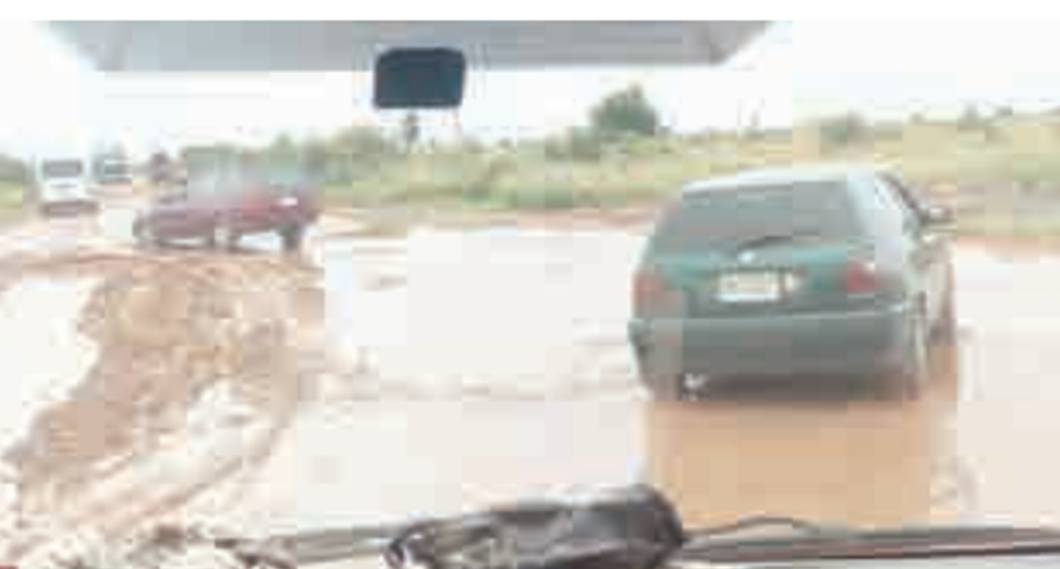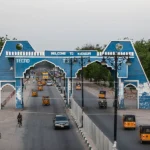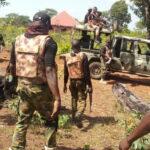The 130-kilometre road linking Maiduguri with Damaturu is a major access route to the Borno State capital from most parts of Nigeria.
But the stretch between Auno and Jakana, not far from the state capital, has become a death trap for travellers who are frequently targeted by insurgents, Daily Trust reports.
- Apapa gridlock: Extortion causes nightmare, losses for importers
- Why God spared my life amid COVID-19 – Obasanjo
Hundreds of people have been ambushed and killed while others were abducted by Boko Haram terrorists along the Damaturu-Maiduguri highway in the last 10 years as the activities of the insurgents have turned the vast road into a death trap.
The highway is the only major link into the Borno State capital as other roads, including the Gwoza-Bama-Maiduguri and the Biu-Damboa-Maiduguri roads have been deserted by commuters because of frequent attacks by insurgents.
Most recent attack
The most recent security breach was the abduction of at least 35 travellers on Friday, December 18, 2020, when gunmen ambushed commuters along the road.

Sources said over 40 attacks had been carried out on the highway last year.
Drivers and passengers attribute the constant attacks on the road partly to the incomplete dualisation of the highway from Kano to Maiduguri.
The contract was awarded during the administration of former President Olusegun Obasanjo.
According to them, the uncompleted sections of the road, particularly the Damaturu to Maiduguri stretch, had since become launch pads for Boko Haram attacks on travellers, especially on the stretch between Auno and Jakana, and in some cases, up to Mainok.
In February, 2020, insurgents attacked travellers stranded in Auno after the military had closed the road for the day and killed 30 persons, abducted many and torched about 20 vehicles, some with passengers in them.
The road is patrolled frequently by military operatives who also have several checkpoints on the route.
Why Road Is Lifeline For Borno
People can enter or leave Maiduguri through five routes, including Baga Road for people approaching from Monguno and other parts of Northern Borno and the Lake Chad Region; Dikwa Road for people going to Maiduguri from Gamboru-Ngala and some parts of Cameroon; Bama Road for people approaching from Banki and parts of Adamawa State; Damboa Road for people approaching from Biu and Gombe states and then the Damaturu Road that ushers people into the capital from the North West.
Sadly, with the exception of Damaturu Road, all the rest have been rendered inaccessible over the years.
Nigerian security forces claimed to have “cleared” the roads on several occasions, yet people must be escorted by them to have safe rides thereon.
For now, Damaturu Road is the major and “safest” artery that links Borno State, which is in the far North East, with the rest of the country.
People need no escort to pass through it, but this is at great risk.
Anyone going to Maiduguri by road from Lagos, Port Harcourt, Onitsha, Abuja, Jos, Kano, Kaduna or Jigawa must pass through the Damaturu Road.
Similarly, people from Borno and neighbouring Chad, parts of Niger Republic and Cameroon coming to other parts of Nigeria by road must also pass through the road.
However, despite its importance, the road is now in disrepair. It has also earned notoriety for being a death trap for commuters who are being slayed by terrorists.
Travellers now call the road in Hausa “Shiga da alwalarka”, meaning people should purify themselves with ablution before embarking on any trip on the road because they may be killed or abducted.
Analysts say Boko Haram fighters are putting pressure on the Damaturu-Maiduguri Road believing that once they make it difficult to pass, they have scored a major point by severing Borno from the rest of Nigeria.
They further say the recent attack in Zabarmari near Maiduguri where rice farmers were slaughtered points to the desperation of the Boko Haram terrorists to harm people in the state capital.
Our correspondent reports that this is not the first time Boko Haram fighters are putting pressure on Maiduguri.
Recall that in 2014, the insurgents decommissioned all the other routes leading to Maiduguri by destroying bridges and creating large craters on highways thereby leaving people with no option than the Damaturu Road which they also kept mounting pressure on through intermittent attacks.
For instance, at the height of the insurgency, people from Damboa, a distance of less than 100 kilometres to Maiduguri, had to go back through Biu-Gombe-Bajoga-Fika-Potiskum-Damaturu before getting to Maiduguri thereby going over 500 kilometres in six to seven hours.
A security expert, Salihu Bakhari, warns the government that, “If Damaturu Road falls, people can only access Maiduguri by air; which is beyond the reach of more than 85 per cent of the people going to Borno from any part of the country.”
Closes at 04:30pm
Commuters told Daily Trust that the attacks happened after the military patrols had ended for the day, especially between 04:30 and 05:00pm, leaving many travellers dead or missing.
Some travellers who managed to escape said the attacks were mostly in the “evening when the sun is descending.”

A driver, who evaded an attack near Jakana on his way to Maiduguri, said it was a horrible experience.
The driver said, “My fuel truck was carrying over 9,000 gallons of petrol when the armed men blocked the road one evening during the wet season.
“Many other trucks and buses were stopped a few kilometres to Jakana.
“They (insurgents) asked me to drive the truck off the road along a bush path, and I told them the vehicle would get stuck in the mud, but they refused to heed my advice.
“A few meters into the bush, the truck got stuck in the mud.”
He explained that the insurgents then siphoned fuel from his tank into jerry cans and drove away in their vehicles loaded with stolen valuables and foodstuff which were being conveyed to the capital and set one vehicle on fire, adding that he thereafter trekked to Jakana.
Twice lucky
Abdullahi Bawuro, a taxi driver, had two encounters with the insurgents.
In one of the incidents, he recalled bullets missing him by inches.
Bawuro said, “I cannot remember the exact dates of the attacks, but they certainly happened over a year ago.
“On the first occasion I was carrying two passengers in my car to Maiduguri on that day around 10:00am and a few kilometres to Mainok from Damaturu, the engine developed some mechanical issues and the passengers joined another vehicle and left.
“While I was waiting for assistance from other drivers, I heard gunshots; which forced several vehicles to turn back.
“A driver moving in the opposite direction stopped to warn that my life was in danger because the insurgents had stormed the area.
“He helped and towed my car back to Damaturu.”
Following assurances by other commuters that the attack had ended, Bawuro said he embarked on another journey to Damaturu on the same day at around 03:00pm.
He explained that, “To my dismay, the car’s accelerator became jerky and the engine stopped, but this time, a few metres after Auno.
“Again, as I waited for an auto mechanic, I heard gunshots and saw trucks moving towards the road from the bush with people inside shooting.
“Some men hiding in trees close to me climbed down and one of them asked what I was doing there and I said my vehicle had a problem and they said I should stay where I was.
“Later, a truck carrying the armed men stopped ahead of my car, one of the gunmen asked why I was standing near my car, and I gave him a similar answer I gave his colleagues.
“He also asked if I was Kanuri and I said I was Fulani and he replied, ‘You are lucky, we would have gone with you to work for us.’
“They later brought out a rope with which they pulled my vehicle to a place before Njimtilo where they left me.”

Worst attack on soldiers
Bawuro further said soldiers later arrived and went after the insurgents.
While the February attack at Auno may be the most famous, the attack on a military base in June in the village resulted in the deaths of seven soldiers.
In October, 14 soldiers were killed during an attack on a military base at Jakana, while three travellers were killed in a December attack on the road and dozens of others abducted.
The military base in Mainok, which helps secure the road, has suffered attacks, including one in January last year in which seven soldiers died.
The Chairman of the National Union of Road Transport Workers (NURTW), Borno State branch, Alhaji Abba Shuwa, said most of the attacks took place at bad sections of the uncompleted highway where motorists had to slow down to avoid potholes.
Alhaji Shuwa said if the government completed the road quickly and increased military patrol, especially between Auno and Mainok, lives would be saved.
National outcry
The December attacks on travellers generated national outcry over poor surveillance on the road to the extent that the Governor of Borno State, Babagana Zulum, visited the area.
The governor, who did not see a single patrol unit on his early morning visit, addressed residents and accused security forces of negligence.
However, after the visit, soldiers, policemen, vigilantes, hunters and the Civilian JTF were drafted to provide additional security for travellers.
Four more checkpoints were erected at black spots between Auno and Jakana, Mainok and Benisheik, Benisheik and Ngamdu, as well as Ngamdu and Warsala.
Sleeping in the wilderness
Once the highway is closed towards evening, hundreds of travellers are forced to spend the night in Damaturu or Benisheik.
Mercy Ibrahim and her three-year-old daughter, travelling in a commercial bus, arrived at the checkpoint at 04:50pm and had to spend the night at Damaturu.
She said, “We spent the night on mats in a crowded room at the Yobe Line Park. The men slept in a separate room.
“I could not sleep because the room was noisy.”
Another traveller, Bakura Yusufa, said he had “a harrowing experience” because he did not plan to sleep on a mat.
“We paid N200 for each mat and we were close to 30 in one big room.
“Those who arrived Damaturu late slept in the open despite the cold. Again, your vehicles have to wait on a long queue until soldiers
remove barricades at 07:00 am in Damaturu and at 08:00am in Benisheikh”, Yusufa said.
He further said, “Even mid-level public servants and small business owners spend most of their savings on air tickets to Maiduguri because they are gripped by fear of being attacked.”
A commercial driver in Damaturu said many people had stopped plying the highway due to the insurgency as commercial drivers, businessmen, civil servants and students were on many instances attacked, slaughtered and kidnapped.

Forced to fly
A regular traveller by air, Aisha Muhammed, said she had no option than to abandon the road over safety concerns and noted that though Maiduguri airport was the closest to Yobe State, travelling to Maiduguri had turned into a risk she could no longer afford to take.
Aisha said she was still haunted by thoughts of the Auno attack in which many vehicles filled with passengers were set ablaze by the insurgents.
She explained that, “I now patronise either Bauchi or the Aminu Kano airports for my travels, and any time I am going to Maiduguri, I fly from Abuja, return to Abuja before reaching Damaturu on a very expensive ticket.”
Another traveller who has also abandoned the road, Mallam Audu Usman, said he was not satisfied with the security arrangement on the road because the insurgents attacked motorists at will.
Usman said he could not afford air tickets and therefore ruled out any trip to Maiduguri.
However, many travellers have no choice and Daily Trust caught up with them as they were travelling to Maiduguri.
One of the passengers said, “I have a wife and five children schooling in Maiduguri. I have some in Damaturu. I travel every two
weeks.
“It is enough panicking on the road these days, but we have to look after our families.”
Another passenger, Bukar Amadu, said, “I am a fish dealer and I buy stock from Maiduguri regularly. I travel for business purpose and I am confident that God will protect us as we embark on this journey.
“I think the uncompleted section of the road from Jakana to Maiduguri also contributes to these attacks; government should complete that section.”
Resort to prayers
A commercial bus driver said he had been plying the road for the past seven years and had never encountered any incident.
“Some of our colleagues lost their lives in attacks and crashes along the road. We resorted to prayers for God to
continue to protect us and bring normalcy on this road.
“We have also seen some improvements these days because there have been joint patrols along the road”, he said.
Meanwhile, the Chief of Army Staff (COAS), Lieutenant General Tukur Buratai, last week during a visit to Damaturu, assured the Yobe State Governor, Mai Mala Buni, that the army had taken far-reaching measures on the Damaturu-Maiduguri Road to safeguard the lives of the people.
“We will have strategic engagements in the next few weeks to further improve security in these areas,” the COAS said.
Responding, Governor Buni commended the army for their commitment to the fight against insurgency and banditry across the nation.
He assured the COAS of the support of the state government to the fight against insecurity.
Buni attributed the relative peace enjoyed in the state and North East to the commitment of the Nigeria Army and other security organisations.
“The contributions of the army to the relative peace we now enjoy is quite enormous and appreciated,” the governor said.

 Join Daily Trust WhatsApp Community For Quick Access To News and Happenings Around You.
Join Daily Trust WhatsApp Community For Quick Access To News and Happenings Around You.

